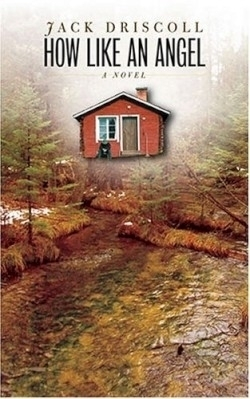How Like an Angel
A Novel
- 2005 INDIES Finalist
- Finalist, Literary (Adult Fiction)
“Look. It’s empty out there, & cold. / Cold enough to reconcile / Even a father, even a son.” This epigraph from the poet Larry Levis launches this novel, set in northern Michigan. With prose at once lyrical and plainspoken, the author is a bold guide through the forest of human longing and loss, where fathers and sons must dare find their way home.
Driscoll, writer-in-residence at Interlochen Center for the Arts, has previously written four books of poetry, a short story collection, and three novels. His writing commendations include the Barnes & Noble Discovery Award, an NEA Creative Writing Fellowship, and an NEH Independent Study Grant. Driscoll summons an elegance of language, and then charges it with visceral, unruly emotional power. The resulting tension between control and volatility makes clear how much is at stake in this fictional family’s efforts to belong together.
Archibald Angel grows up with parents who reside uneasily under one roof, slogging against “the simple truth that we’d worked long and hard at becoming strangers.” At Angel & Sons Funeral Home, his mortician father wears stiff suits and black wingtips, and steers his hulking hearse like a dark boat through town. “Life goes on,” says Archie’s father, “but rarely long enough to get it right.” He’s a man so betrayed by life that he derives his only solace from a “mission of closure”—the makeovers he administers to the dead. He prides himself on how good they look, “how peaceful at last, by the expert laying on of Angel hands,” as if dignity and relief could be achieved solely in the afterlife.
In the here-and-now, the Angels fail to maintain “Kodak moment” appearances. Archie’s mother, Millicent Angel, gathers books around her, and mutters poems like prayers or incantations to protect the soul. “Playing Russian solitaire for hours, housebound, and killing the days,” she’s burdened by her awareness of the real Paradise Lost, a “world absent of poets,” where people exist side by side in emotional exile—cut off from each other and their environment.
When Millicent flees home to recover from a mental breakdown, Archie and his father venture out to a Deadstream backwoods cabin: “in the natural world, my father was completely out of his element, a man without a single, imaginable course of action.” As Archie watches snow geese streak across the sky on the “long migration home” he’s bearing witness to a journey that appears stunningly beautiful and impossible to experience. To locate where one’s heart truly resides seems a perilous, even reckless notion. Yet out in the woods, Archie and his father both yearn for shared warmth: “The blue flame of his Zippo lighter moved back and forth in front of his face—like he was trying to locate something in the dark, rather than light a cigarette.”
Now an adult, Archie resists joining the ranks of Angels who are consigned to giving and finding comfort among what is already dead. Recently divorced, he heads back to the cabin, to determine what legacy he’s willing to accept from his father—and whether anything might be redeemed to pass on to his own young son, Rodney.
At first glance, Archie is an unlikely hero, whose glory is found not in dramatic feats or even in holding down a job, but in the courage to pursue love and redemption in this life, rather than the joyless virtue of waiting for the hereafter. “In the final analysis,” Archie says, “that’s how we’ll be spared. By having someone we love nearby.” His hopefulness is a kind of defiance, and ultimately, in How Like An Angel, a profoundly romantic sensibility unfurls, despite a family history of darkness and grief.
Driscoll’s ethic of literary craftsmanship places him among the rebel writers in an era of truncated attention span. His novel challenges the page-turner culture of formulaic, pre-packaged “pop lit” in which a book’s worth is measured by how swiftly it can be consumed. Here, the language is so rich in flavor and nourishment that it frequently rouses the desire to linger and re-read a single line or paragraph. Like real intimacy itself, this novel insists on its own pace, and continually moves readers in unexpected ways.
Disclosure: This article is not an endorsement, but a review. The publisher of this book provided free copies of the book to have their book reviewed by a professional reviewer. No fee was paid by the publisher for this review. Foreword Reviews only recommends books that we love. Foreword Magazine, Inc. is disclosing this in accordance with the Federal Trade Commission’s 16 CFR, Part 255.

